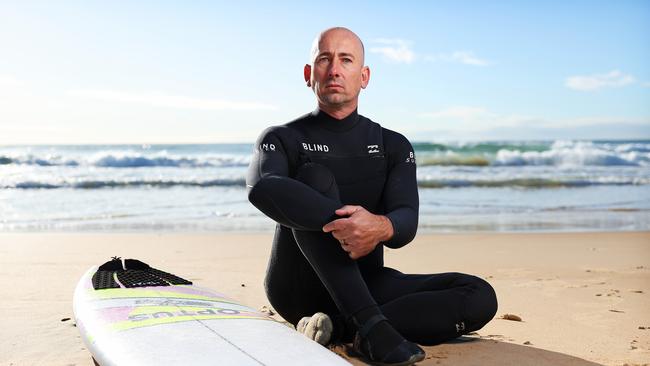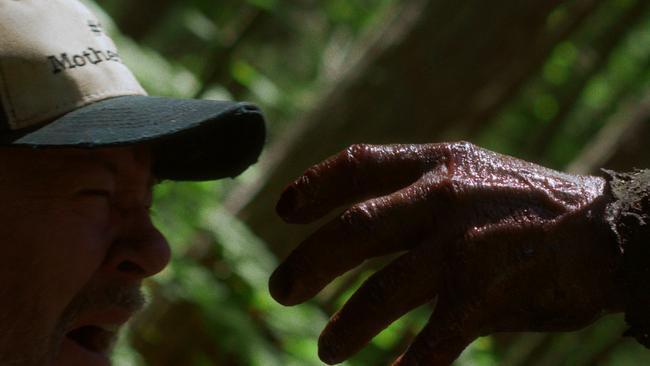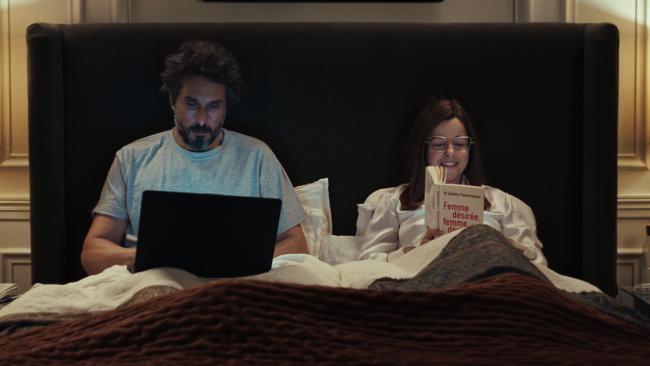The experts said ‘his life is finished’. His parents were having none of it
With the Paris Olympics drawing to a close, Matt Formston’s story is a reminder of a truth in sport, and life in general. ‘People will tell you that you can’t do something,’ he says. ‘But if you try you can.’

The uplifting documentary The Blind Sea is about disabled Australian athlete Matt Formston. Its theme song should be Chumbawamba’s Tubthumping. “I get knocked down, but I get up again.”
Formston, 46, has been knocked down since he was five years old and diagnosed with macular dystrophy. He has only three per cent vision.
The medical experts said “his life’s finished”. His parents, Don and Lorraine, were having none of that. “There’s no such thing as barriers, there’s only obstacles,’’ Don says, and their son has been clearing the obstacles ever since. He’s a former paralympian (in para-cycling) and a three-time world champion blind surfer. He has a successful corporate career and is married with three young children. It’s the failure to clear an obstacle — winning a fourth blind surfing title — that is the hook for this documentary written, directed and edited by Daniel Fenech and filmed by Chris Bland.
Formston’s wife, Rebecca, notes that when her husband tries to do something and falls short, his response is to try to do something even harder. Hence he heads to Nazare, Portugal, home of the biggest and deadliest waves on the planet.
He is supported by an expert team but in the end he has to face the “mountains of water” as his surfer friend Layne Beachley describes them, alone.
The spectacular cinematography shows what a forbidding summons this is. With the Paris Olympics drawing to a close, this documentary is a reminder of a truth in sport, and life in general. “People will tell you that you can’t do something,’’ Formston says. “But if you try you can.”
The Blind Sea (PG)
95 minutes
In cinemas from August 15
★★★
-
A Violent Nature
A Violent Nature, written and directed by Canadian filmmaker Chris Nash, is the most gruesome film I have seen. It makes Mary Harron’s 2000 adaptation of Bret Easton Ellis’s 1991 novel American Psycho look like a teddy bears’ picnic.
It is so ruthlessly, mercilessly, casually, relentlessly, violent that it will deter lots of viewers, which is understandable but unfortunate for the director because I think he is making a point about the slasher movie genre.
It’s also an interesting film in terms of technique. The director has cited as an inspiration the “slower, more methodical’’ movies of American filmmaker Gus Van Sant, such as Gerry from 2002 and Elephant from 2003. And this film is slow, in a deliberate sense, and methodical, in a deliberate sense. Here’s the set-up: a group of young people in the woods of Ontario go to a cemetery and take a necklace they see hanging there.
This awakens its owner, Johnny (Ry Barrett), who crawls from the grave and lumbers off in pursuit of his necklace. A brief back story tells us why this piece of jewellery matters so much to him and how he ended up in the grave. It also suggests it’s not the first time he’s left it.

From this moment, the movie is shot entirely from his point of view. In most films, Johnny would disinter himself, start walking and there would be a cut to a new scene where he’s at his destination.
Not here. The silent Johnny plods the long distance to the young people’s holiday shack. There is no soundtrack and little dialogue. The main noises we hear are people fleeing Johnny, their bodies crashing through the undergrowth, his implacable footsteps behind them and then the repeated heaving of an axe through a skull, and far worse than that. The director has a background in special effects and prosthetics and he puts it to use in a scene involving Johnny, a hook and a young woman. Even my 19-year-old son, who thinks he’s unflappable, found this hard to watch.
Asked about this scene in an interview, the director said he wanted to learn “how far do we take it?” when it comes to “how much destruction we can cause to one human body”.
Having said all of the above, there is some humour in this movie, albeit of a sanguinary sort. Johnny’s means of breaking into a park ranger’s office still makes me laugh our loud despite myself.
Nash may not have subverted the slasher genre but he has subverted its expectations. There are no jump scares. There’s no one hiding under a bed or in an attic or basement. There’s no kitchen bench with a knife block on prominent display. Indeed, there is little tension, because it’s soon apparent the killer is just going to go about his slow, deliberate, methodical business. In another deliberate move, this is a slasher movie that looks like a nature documentary. A violent nature, as the title suggests.
As someone who sees a lot of films, I am impressed by the daring originality of this one, which premiered at the 2024 Sundance Film Festival. It will not be everyone’s cup of tea but I have a feeling it will become a cult film, a bit like David Lynch’s Eraserhead, which was branded unwatchable on its release in 1977.
A Violent Nature (MA15+)
94 minutes
In cinemas
★★★½
Iris and the Men
Do you feel like having a bit of fun? Then take yourself to Iris and the Men, a conversation-starting French comedy starring Laure Calamy from the TV series Call My Agent!
It’s just about worth the ticket price for an extended scene in which Calamy, in a tight red dress, dances through the streets of Paris, flocked by suitors, and sings a version of the 1980s hit It’s Raining Men.
And at this point in the film, which is directed and co-written by Caroline Vignal, it is pouring down with men for Iris (Calamy), who is about to turn 50. It’s a significant shift from the opening, when she is being treated by an osteopath and it’s clear a man has not been this close to her body for a while.

“Let yourself go,’’ he tells her, and she soon takes his advice.
It’s another woman, though, who puts Iris’s finger on the trigger.
Iris has been with the same man, Stephane (Vincent Elbaz), for 22 years. They have daughters aged 10 and 15.
When she tells a friend that “It’s died between us in bed”, a woman who overhears advises her to find a lover and recommends a dating website. “It saved my life,’’ she says.
When Iris reveals how long it is since she has had sex it requires a suspension of disbelief (at least on the part of this viewer). There are droll moments when she and her husband are in bed; he working on his laptop, she reading books such as A Frozen Woman, by the French Nobel laureate Annie Ernaux.
Iris, who is a dentist, pulls the trigger and starts meeting lots of men. She has several rules, including that each assignation is a one-off, “even if it’s good”. No repeats. She loves her husband and wants to remain with him. The men, as you may expect, do not quibble with this rule.
Calamy is brilliant as a woman rediscovering her sexuality. The look on her face is all you need to see. She is excited to be alive. It’s intoxicating to watch.
The director’s previous film is the 2020 comedy Antoinette in the Cevennes, starring Calamy and a donkey. She has fun with what it’s like for a middle-aged married woman to be on a hook-up app. When the men contact her, they appear in the scene, such as when she is surrounded on a subway train by men who aren’t physically there.
This is a laugh-out-loud comedy but it does explore moral questions. Iris lies to her husband, for starters. She tells her daughters, who are being taught go say no, that they “should also learn to say yes”. And when she is honest about how the martial passion stalled, the reason is not what I expected.
This is close to a four-star film. I think the ending is disappointingly contrived, but other viewers may disagree, just as Iris does when one of the men, who uses the online handle No Vanilla, pulls out — well, what he pulls out is something to see for yourself.
Iris and the Men (M)
French language with English subtitles
98 minutes
In cinemas
★★★½

